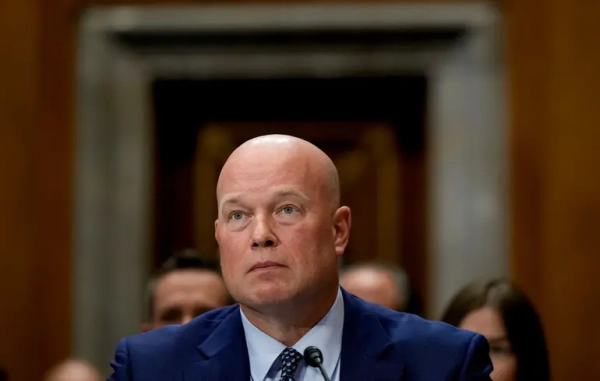
Is the United States of America a failed state?
Looking at the American government’s response to the coronavirus, it seems that, at the very least, Americans have a failed government: This administration did not adequately assess the threat despite having at least two months to map out a plan, and it botched its response once the crisis was full-blown. We’ve paid a high price for that failure. The incompetence of Donald Trump’s administration has almost certainly cost lives.
Whether this counts as a “failed state” is a more slippery question. The term comes from political science, where some people take it to mean a state that has lost its monopoly on the use of force and others define it more broadly, as a state that can no longer provide the basic services you’d expect of any sovereign government — like protecting and educating citizens.
A recent essay in the Atlantic by George Packer, author of the 2013 book Unwinding: An Inner History of the New America, makes the case that America is, in fact, a failed state. Or, to be more precise, Packer argues that we’re watching the state fail in real time. But what does that mean? And can we fix whatever is broken?
Some conservative writers, like National Review’s Michael Brendan Dougherty, have quibbled with Packer’s failed state thesis, so I reached out to Packer to talk about what he really wanted to say in that piece. I’m sympathetic to his underlying argument, but I wanted to focus less on whether America meets some arbitrary threshold for failed statedom and instead discuss what’s wrong and whether the system is salvageable in his mind.
I also asked him about how the failures the US is witnessing predate Trump, and why he thinks Sarah Palin’s nomination for vice president in 2008 was a real sign that things had gone off the rails. It showed, Packer told me, that the Republican Party had become a “machine for keeping itself in power at all costs,” and the long-term consequence of that approach has been the destruction of the idea “that there’s a common good and that government can solve problems.”
A lightly edited transcript of our conversation follows.
Sean Illing
“Every morning in the endless month of March,” you write, “Americans woke up to find themselves citizens of a failed state.” A failed state? Really?
George Packer
No, America doesn’t meet the textbook definition of a failed state. I have reported from a number of failed states — really failed states — like Sierra Leone and Ivory Coast during their civil wars, Iraq after the invasion, Somalia. Those are failed states. Here, things are still working. The police are patrolling. Ambulances are answering 911 calls. Government checks are arriving in the mail.
I was speaking figuratively, or writing figuratively, when I said that we’re living in a failed state.
Sean Illing
So what were you thinking when you wrote that?
George Packer
I had this terrible memory of those days in March when everyone was trying to figure out what to do about this pandemic. Do we keep riding the subway? Do we go to work? Do we send our kid to school? And there was no instruction or guidance coming from the authorities. In fact, there were lies, there were fantasies, there were dangerous musings, and I remembered thinking this is what it must be like when citizens have to take matters into their own hands in a situation where normally you would be looking to government for guidance. And in that sense, the state had failed. It was not there. It was absent.
The piece is not really about a failed state — it’s about failures of the state, and that’s a different matter.
Sean Illing
I think most people can recognize a distinction between being a failed state and acting like one, and the case that we’re acting like one right now is strong —
George Packer
And this was a case where only the government could make certain decisions. Only the government could organize certain responses, could figure out the supply chain, the distribution network, locate the materials and the gear, coordinate with the private sector to turn to production that we needed in an emergency. Only the federal government could do those things, and it was not doing them. And in that sense, yeah, it was failing.
But in a lot of ways, civil society reacted well. People made pretty good decisions. People were deciding on their own to do what was necessary. This office is going to close down. This school is going to close down. And people were taking it seriously when they began to realize how serious it was. So I’m actually heartened by the reaction of a lot of our society, but we couldn’t do it without a federal government leading, and it failed miserably.
I thought it was alarming. I still think it’s alarming.
“Thousands of people are dead because of the character of Donald Trump”
Sean Illing
Let’s set aside the academic discussion about what constitutes failed statedom — no one really gives a shit about that anyway. Tell me one big, consequential thing that you think is fundamentally broken in America.
George Packer
Most immediately, what’s broken is the presidency. We have a failed president, if not a failed state. And I remember talking to a big corporate type during the 2000 election who told me, “You know, it doesn’t really matter who’s president because we have this incredible economy, we have this very advanced society, he’ll have good advisers, whoever he is.” In other words, the person at the top is like a figurehead and the rest of it will run itself.
And we sort of found out that wasn’t true very quickly in George W. Bush’s first term. But we really found out it’s not true now. The president is enormously important, and if his character is as wretched as this president’s character, and if his values and impulses are as miserable as his, then it has consequences of life and death. People are dead. Thousands of people are dead because of the character of Donald Trump.
There are, of course, lots of other things that are broken in America. Obviously, Congress, for years and years, has been unable to come to compromises and decisions about basic, chronic, serious problems from climate change to economic inequality to infrastructure decay. Interestingly, Congress has been able to spend a couple of trillion dollars very quickly in the middle of this because it’s an emergency, and senators and congresspeople understand that the public will not stand for the usual polarized mess. But it’ll come back quickly, and it’s been there for a long time.
What I tried to describe in my book Unwinding is how institutions in this country are failing the people who look to them for support, how they’ve been failing them for a long time and continue to fail them today. The ground keeps shifting beneath the feet of a lot of Americans, and the federal government is not able to help.
Sean Illing
Is it possible that we might be overreacting to Trump, that this is an anomaly that reflects a seriously compromised system but not necessarily an unsalvageable one?
George Packer
I’ve been asking myself that, too, because I don’t want to overreact to the emergency of the moment or get carried away with rhetoric that isn’t really sustained by reality. And yet I keep coming back to the realization that this presidency has just exposed things that were already broken and were just buried or half-hidden. Trump is this horrible accident but also a reflection of deep, chronic problems.
Sean Illing
What problems?
George Packer
Where do I start? It’s so damn hard to support a family in this country, to care for old parents, to raise and educate children, to get sick leave or time off, to maintain health care. We’re talking about the basic goods of life, and people across this country, people who work hard, can’t reliably count on them. These were problems long before Trump appeared.
This pandemic has brought all this out in such stark ways. The workers we count on to keep us alive are showing us that they have very few rights and very little power and are disposable. They’re both essential and disposable. That’s the paradox of the new category of essential workers. The more essential they are, the more disposable they are. To me, that’s a long-term failing that weakens all kinds of bonds and connections that we can’t really afford to lose.
Sean Illing
George Packer
You really lean into the big questions, don’t you?
Sean Illing
It’s part of my charm, George.
George Packer
I have to start with the Republican Party, which over the years has become more and more a machine for keeping itself in power at all costs. At the cost of voter enfranchisement, at the cost of transparency and clean government, at the cost of trust in government. The Republican Party has done incalculable damage to people’s idea that there’s a common good and that government can solve problems. They’ve become a nihilistic party.
It kind of began in the ’90s with Newt Gingrich and it accelerated with the Tea Party, and with Trump it’s reached its full fruition. And Jane Mayer had a pretty potent profile of Mitch McConnell in the New Yorker just the other week that really revealed what we’re talking about. If you listen to what people who know McConnell say, they’re telling you what he and the GOP have become: a party devoted to nothing but staying in power, which now means making sure that lots of people who ought to be able to vote can’t vote, which is such a destructive tactic.
We could dish out a lot of blame in other places, but I want the Republican Party at the top of the list.
Sean Illing
I’ve long thought that Sarah Palin’s nomination was a kind of Rubicon-crossing moment for the country, which in retrospect was so much more revealing than so many of us recognized at the time. You called Palin Donald Trump’s “John the Baptist” in your piece. What did you mean?
George Packer
I remember being in Ohio in September 2008, just after McCain picked her and she made her sensational debut at the Republican convention, and I was sitting in a diner with some Ohio women who were saying how much they liked her and how she reminded them of themselves and she could fit right in here with us, and she’s just like us.
And I remember thinking, “Why do you want to be led by someone just like you who knows no more than you do, who has no more expertise than you? Would you want your heart surgeon to be someone just like you?” It told me that there was a sense that government, among some voters, was no longer something that required expertise or qualification or excellence, but rather it was more like a show. People just wanted someone to stick it to the other side. Partisanship isn’t new, it’s as old as the republic, but partisanship leading to the collapse of standards to that degree felt new.
Trump has so many of her qualities, her love of attention and celebrity, and her willingness to say anything and her contempt for people who have an education or who sound like experts. All of that was foreshadowed by Sarah Palin. But I also thought the country had rejected it in 2008 with Obama. It turned out that didn’t really happen. We were still moving in that direction. We just weren’t quite ready for her yet.
“Trump is this horrible accident but also a reflection of deep, chronic problems”
Sean Illing
Something like 62 million people voted for Trump, and that was a vote for chaos, for disruption, and it was a vote against expertise, against experience. Now, I know there are a lot of reasons why people voted for Trump and it’s complicated, but we also can’t deny this part of the story and we can’t pretend that a lot of people didn’t want to break the government.
George Packer
I think you’re right. And one thing that struck me about Trump’s rallies was that they had very little positive content, very little uplift. Even a fascist demagogue needs to give his people a vision that inspires them, that makes them willing to work long hours and to sacrifice and possibly die. That was not Trump. And I also don’t like the word fascist in the context of Trump because he’s something else altogether. Trump was a showman who brought out people’s lowest instincts and made them acceptable, made them desirable.
I remember in 2015, before the primaries began, I was interviewing some striking steelworkers in eastern Ohio and I wanted to talk to them about politics, and they were on a picket line and so they were willing and able to talk, and it turned out none of them were for Jeb Bush, who was the frontrunner, and none of them were for Hillary Clinton, who was the frontrunner. They were all for either [Bernie] Sanders or Trump. And that had something to do with their general disgust with things as they are.
And I asked one of the guys about Trump, and he said to me something like, “He is like a mirror that reflects back the way they see us.” And the “they” was people like me and you, people who were going to vote for Clinton, who talked about the “deplorables.” And they [the steelworkers] knew Trump was a buffoon, but they also had this feeling of, “Okay, you want deplorable, I’ll give you deplorable.” And Trump was a vehicle for that feeling, a nihilistic vehicle, and there was just no vision of any good society behind any of it.
Sean Illing
At the same time, and this is something you document in your book, a lot of this bitterness and cynicism is justifiable. Globalization and automation have ripped apart so many communities across the country, and people feel that they’ve lost any agency at all over their lives, and that the spoils of this new order have gone to people behind desks and computers, people on the coasts and in the cities.
That’s all a long wind-up to a question looming over this conversation and your essay: Is it possible that liberal capitalism has just run its course, that it’s produced a world that’s grossly unequal and grossly unrepresentative, that’s destroyed our environment, and that perhaps the “failure” we’re witnessing is the interregnum between the death of liberalism and the birth of whatever comes next?
George Packer
Man, that’s a huge question. I don’t consider myself a global thinker or a futurist. I’m not very theoretically minded; I didn’t get a degree in political theory or philosophy like you did. It’s hard for me to think in such large terms.
What can I say? Is this the end of liberal capitalism? It’s certainly been declared moribund many times over the last century. And it keeps on rebounding like a virus. It just seems unkillable. It also produces good things and has been incredibly successful in this country for a long time. But right now it’s not answering our needs and it’s not solving our problems.
I think we’re at a point where people should be asking big questions. People should be really thinking about transformational changes. I hope that’s the one thing that can come out of this disaster that might be good.
Sean Illing
You wrote: “If 9/11 and 2008 wore out trust in the old political establishment, 2020 should kill off the idea that anti-politics is our salvation. But putting an end to this regime, so necessary and deserved, is only the beginning.” If that’s the beginning, what do you hope comes next?
George Packer
What I hope happens is that we start to rebuild with laws and policies and projects that are based on a realization that we are in it together and that when the country’s as divided as it’s been, it really is unhealthy and dangerous for all of us. That we really can’t escape each other and that we need a sense of what it means to be part of this country that doesn’t simply dismiss half the population, whether it’s the half that is in the service worker class, or the half that is of a different political party, or the half that’s a different color.
It’s as if we began to think that we will be able to move on by forgetting about that half of the country, and we can’t, because we’re all tied together. That’s what a virus does. It shows us the incredible network of bonds. It does it in a really terrible way, but it might not be so bad to realize that those bonds still exist, that we still need each other.
Support Vox’s explanatory journalism
Every day at Vox, we aim to answer your most important questions and provide you, and our audience around the world, with information that has the power to save lives. Our mission has never been more vital than it is in this moment: to empower you through understanding. Vox’s work is reaching more people than ever, but our distinctive brand of explanatory journalism takes resources — particularly during a pandemic and an economic downturn. Your financial contribution will not constitute a donation, but it will enable our staff to continue to offer free articles, videos, and podcasts at the quality and volume that this moment requires. Please consider making a contribution to Vox today.
Sourse: vox.com






